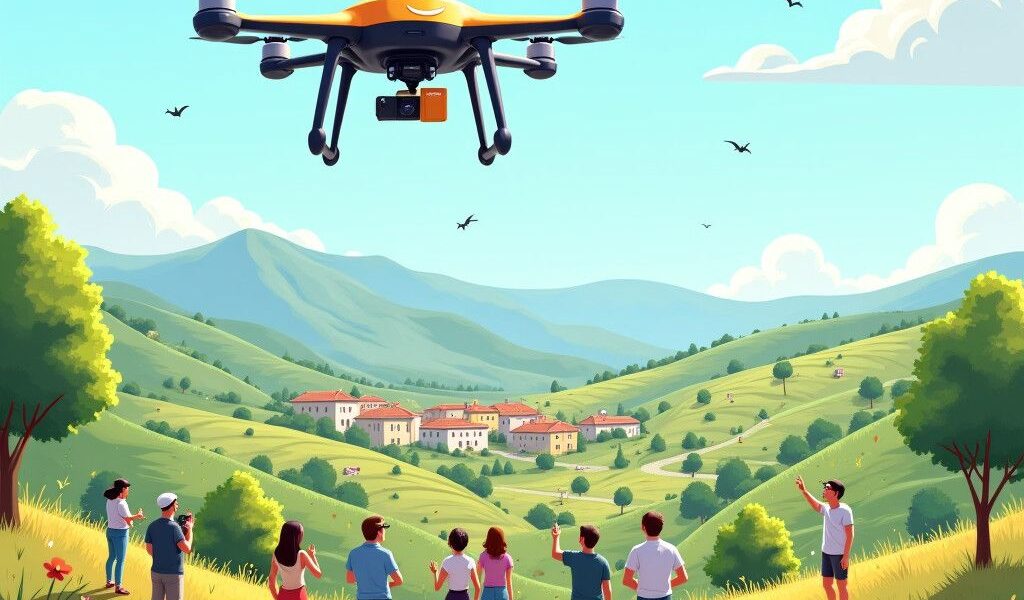Italy Hosts Amazon's First European Drone Trial: A Leap into Future Deliveries
In a significant advancement for delivery logistics, Amazon has launched its first European drone trial in Italy. Conducted in San Salvo, this innovative initiative aims to demonstrate the capabilities of Amazon Prime Air’s MK-30 drones. As e-commerce continues to reshape consumer habits, understanding these developments is crucial for stakeholders in digital marketing, e-commerce, and retail sectors.
The Italian trial marks a pivotal moment for Amazon as it seeks to expand its delivery network across Europe. The chosen location, San Salvo, was selected for its suitable landscape for drone operations, making it an excellent testing ground for this technology. During the trial, the MK-30 drones showcased their ability to deliver packages directly to consumers’ homes, a concept that could revolutionize last-mile delivery strategies in urban and rural areas alike.
One might wonder why drone deliveries are generating so much interest. The surge in online shopping, accelerated by the COVID-19 pandemic, has brought immense pressure on delivery services. Traditional methods often struggle with efficiency and speed, leading to longer wait times and customer dissatisfaction. Amazon’s drone delivery system addresses these pain points directly. By utilizing drones, Amazon aims to cut down delivery times to as little as 30 minutes, thus enhancing customer experience considerably.
Key features of the MK-30 drone are worth noting. This drone is designed to transport packages weighing up to 2.5 kg, which covers a wide range of consumer goods. Amazon has carefully selected the drone’s design and technology, ensuring it can safely navigate residential areas while avoiding obstacles. The MK-30 is equipped with sophisticated sensors and machine-learning capabilities that enable it to execute deliveries with remarkable precision.
To gauge the potential impact of this initiative, consider Amazon’s market position. It dominates the e-commerce space, holding a significant share of the market in Europe and beyond. A successful implementation of drone deliveries will not only enhance Amazon’s operational efficiency but also solidify its reputation as a pioneer in logistics innovation. Competitors will undoubtedly feel the pressure to adapt or fall behind, leading to a possible transformation across the entire retail landscape.
As exciting as this trial is, there are challenges that Amazon and other stakeholders must address. Regulatory frameworks around drone usage are still evolving. For instance, countries have differing safety regulations, air traffic control considerations, and public acceptance of drones in their skies. In Italy, the regulatory environment is supportive; however, any mass rollout will require collaboration with local authorities and compliance with safety standards.
Moreover, consumer apprehension about drones delivering packages is a concern that needs managing. Privacy and safety are top priorities for consumers when considering drone deliveries. Educational campaigns highlighting the technology’s safety and efficiency could help assuage these concerns and build trust in the public domain.
Incorporating this technology is not merely an operational shift; it represents a significant pivot in consumer behavior. With Amazon’s constant innovation in delivery options, e-commerce players must reconsider their strategies to remain competitive. For businesses in digital marketing, this is an opportunity to craft new campaigns that emphasize quick deliveries and cutting-edge technology. Highlighting drone capabilities can serve as an attractive selling point to tech-savvy consumers seeking convenience and speed.
Moreover, retailers must also explore how they can integrate drone delivery into their logistics frameworks. Logistics partnerships with providers of drone technology might emerge as viable strategies for smaller retailers seeking to enhance their delivery services. This shift can lead to innovative delivery models, such as local hubs for drone dispatch that allow for more efficient last-mile deliveries.
In conclusion, Amazon’s foray into drone deliveries in Italy is a bold step toward transforming the e-commerce and logistics landscape. It sets a precedent that could influence the future of retail delivery. As businesses analyze these developments, the potential for advancement exists not just for Amazon but for anyone ready to rethink their marketing strategies and operational models. Industry professionals must keep a keen eye on such innovations, preparing to adapt and thrive in an increasingly competitive marketplace.








